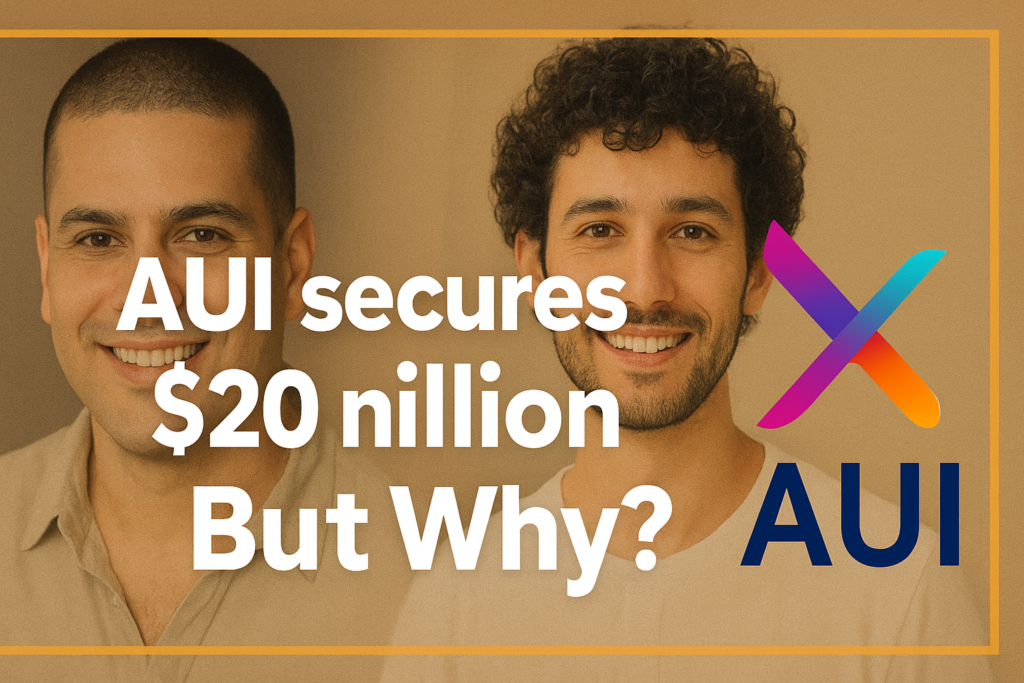Augmented Intelligence (AUI) secured $20 million in funding at a $750 million valuation cap, marking a decisive moment in enterprise AI evolution. Founded in 2017 by Ohad Elhelo and Ori Cohen, AUI addresses the critical challenge plaguing enterprise AI deployment: creating agents that reliably execute actions rather than merely generating conversational responses. This SAFE round, backed by eGateway Ventures and New Era Capital Partners, brings total funding to approximately $60 million and positions the company to accelerate Apollo-1’s commercial deployment across regulated industries where reliability is non-negotiable.
What Is AUI’s Apollo-1 AI Model?
Apollo-1 represents a fundamental architectural revolution, deploying neuro-symbolic reasoning to guarantee predictable, policy-compliant enterprise actions. Unlike conventional large language models that predict text tokens, Apollo-1 predicts structured actions through symbolic reasoning layers. Every conversation transforms into hundreds of symbolic elements—intents, entities, actions, contextual parameters—enabling deterministic rule-based logic while maintaining conversational fluency. Benchmark performance validates this approach: Apollo-1 achieved over 90 percent task completion on τ-Bench-Airline versus Claude-4’s 60 percent, and completed 83 percent of Google Flights scenarios compared to Gemini 2.5-Flash’s 22 percent. Organizations can define behavioral contracts guaranteeing specific actions execute every single time, eliminating the probabilistic uncertainty that prevents confident AI deployment.
Why Did AUI’s Valuation Jump to $750 Million?
The 114 percent valuation surge from $350 million to $750 million reflects investor recognition that AUI solved enterprise AI’s reliability crisis. This dramatic increase stems from three converging factors: the strategic Google Cloud partnership providing enterprise infrastructure and immediate market access, perfect timing as organizations demand AI systems delivering compliant, auditable execution beyond conversational capabilities, and a revolutionary economic model deploying one scalable solution across multiple enterprises rather than bespoke implementations. After seven years developing technology merging neural fluency with symbolic precision, the founding team demonstrated exceptional technical depth and execution patience. The company now employs 45 people across Tel Aviv and New York, positioned for aggressive expansion following this capital infusion.
How AUI Partners With Google Cloud
The Google Cloud alliance transforms AUI’s commercial trajectory by integrating Apollo-1 directly into Google’s enterprise infrastructure. This partnership delivers turnkey access to neuro-symbolic AI capabilities while maintaining data within Google’s secure, compliant environment—critical for regulated industries demanding data sovereignty and security audit trails. For AUI, Google’s enterprise relationships provide immediate credibility and distribution channels that typically require years to establish independently, accelerating the commercial momentum justifying the $750 million valuation. The technical integration enables seamless Apollo-1 deployment with complete traceability into AI decision-making processes, satisfying enterprise governance requirements that black-box systems fundamentally cannot address. This white-box visibility represents a competitive advantage that purely generative approaches structurally lack.
AUI vs ChatGPT: Key Differences Explained
The architectural distinction between Apollo-1 and ChatGPT reveals why enterprises demand alternatives to transformer-based systems. ChatGPT predicts probable text tokens, generating natural-sounding responses lacking guaranteed behavioral consistency. Apollo-1 predicts structured actions, operating on symbolic states enabling deterministic outcomes essential for regulated environments. When insurance companies require customer interactions to verify coverage before discussing claims, ChatGPT might perform this check frequently—but “frequently” creates unacceptable compliance exposure. Apollo-1 guarantees verification occurs in every interaction through symbolic reasoning rules. ChatGPT excels in open-ended dialogue and creative content; Apollo-1 dominates constrained environments requiring specific business logic execution: processing returns, handling complaints, managing transactions with regulatory requirements. Apollo-1 provides complete traceability with inspectable, editable reasoning steps—capabilities essential for regulated industries but impossible with opaque transformer models.
What Industries Use AUI’s AI Agents?
Apollo-1’s practical applications span high-value sectors where reliability constraints have historically limited AI deployment. Retail organizations deploy agents handling product inquiries, returns processing, and customer service while ensuring consumer protection compliance. Healthcare providers leverage Apollo-1 for appointment scheduling, insurance verification, and pre-visit preparation, maintaining absolute HIPAA adherence and medical protocol compliance. Insurance companies utilize agents for claims processing, policy inquiries, and customer onboarding where regulatory compliance and audit trails are mandatory. E-commerce platforms implement Apollo-1 for customer support, order management, and personalized shopping assistance, maintaining context through complex multi-turn conversations while ensuring pricing rules and inventory constraints execute correctly. Travel and hospitality sectors benefit from Apollo-1’s demonstrated superiority on booking workflows, maintaining context through follow-up constraints and satisfying multiple simultaneous filters.
The $20 million AUI funding validates a critical thesis: enterprise AI demands behavioral certainty beyond conversational fluency. As Apollo-1 approaches general availability in late 2025, this neuro-symbolic architecture bridges AI’s creative potential with enterprises’ operational requirements, enabling confident implementation at scale for organizations previously hesitant due to reliability concerns.

My Name is Adarsh and I am Empowering startups with high-quality content at Startups Union and bridging the gap between brand stories.
